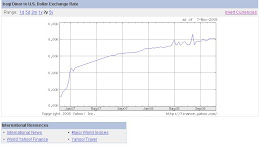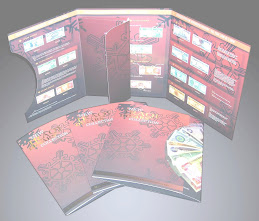By Aiyob Mawloodi
The draft of the 2009 budget is complete and is expected to approved by the Ministerial Council, and then be submitted to the Iraqi Council of Representatives for final approval. There are claims that the parliament will most probably approve it in this month.
The Iraqi Deputy Minister of Finance, Fazil Nabi, says that though the exact amount of the 2009 budget is not fixed and is subject to change; still it is clear that it will be higher than both the main and the supplementary 2008 budgets. He says that the budget is more 90 trillion Iraqi Dinars (approximately US$75 billion)
Members of the Finance Committee expect that the Ministerial Council will submit the draft budget to Parliament by the end of this month, which is an effort to avoid delays in the final approval of the budget. Previous years' delays in the budget approval had been blamed for seriously hurting the economy as a whole, and especially public sector investment projects and the welfare of Iraqis.
"Due to the fact that preparing, approving, and implementing 2008's budget was done very late, we faced some problems with the ministries, and they became the basis for any complaints against the Finance Ministry," said Nabi in an interview with a local Kurdish news agency. "Therefore, we tried to accelerate the process this year, and we sent the project to the Ministerial Council earlier so that they could approve it and send it to Parliament for their approval as well."
While the 2008 budget, including the supplementary budget totaled at US$70 billion, and 2007 budget was even less, the 2009 budget is expected to be much higher than those of the previous years.
Economic experts believe that the main reason behind this tangible increase is mounting oil prices in the global markets at a time when oil is the major source of Iraq's revenues. Some official statistics suggest that more than 70% of the Iraqi government's revenues come from exporting oil.
The Finance Ministry official announced that the draft has been complete since last week, but the Minister has not yet signed it. Hence, the figures are not yet final figures and subject to change both by the Minister and by the Ministerial and Representatives' councils. However, the changes, if any, won't be that significant and are to be approximately the same as they are in the first draft.
There are hopes that the budget will get the final approval by the Presidential Council before the beginning of next year.
Another issue related to the budget is Kurdistan Region's share of it. This has been the major issue in the previous years' budget preparation and approval processes. According to an agreement among different political groups in the country and based on the Permanent Constitution, Kurdistan Region has a 17% share of Iraq's total budget. This has been resisted severely by many political groups, especially in Parliament. Some groups were trying hard to reduce this share and became serious roadblocks in the way of approving the region's share. And this very issue was the main reason behind the delays in approving the 2007 and 2008 draft budgets.
However, there are hopes that this won't be a serious problem for the 2009 budget. Nabi says that 17% is already allocated for Kurdistan in the draft budget. He believes there will not be any problems regarding this issue neither in his ministry, nor in the Ministerial Council. If there is to be a problem about the issue, it will be in the parliament, but is should neither be that serious.
Kurdistan Regional Government's (KRG) budget was mainly spent on wages and little remained for investment purposes, a fact that negatively affected the economy of the region. This problem led to a mandate by the regional Ministerial Council to reduce the number of public employees to save some money for reconstruction and development purposes. Assuming that Kurdistan is to get the 17% fully, then the region's budget will be uniquely high. Bearing in mind that wages and consequently the operational budget is expected to be less than that of previous years, it is normal to expect a much higher investment budget in the next year.
However, the question remains whether this budget is utilized efficiently and invested in necessary and important projects, or wasted with minor projects and through corruption.
(Kurdish Globe)

